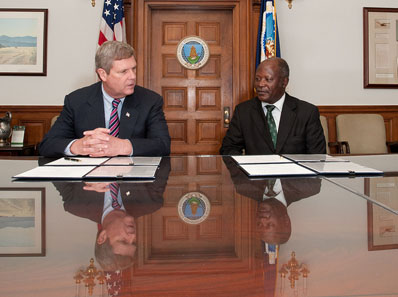Date Published: 23rd November 2010. Author: Ali Withers.
Natural methods have always been among the tools used by farmers and growers to both deal with plant pests and diseases as well as to strengthen the soil. After all, what is compost but decomposing vegetable matter which is then put back into the soil to improve its richness, fibre content and the nutirents plants need for growth.
Plant extracts were arguably the earliest agricultural biopesticides, as history records that nicotine was used to control plum beetles as early as the 17th century. There were also experiments using mineral oils as plant protectants in the 19th century. Biopseticides most frequently used on speciality crops like specific fruits. A study released in 2006 estimated that orchard crops hold the largest share of biopesticides use at 55%.
Biopesticides are derived from natural materials like animals, plants, bacteria, and certain minerals. For example, garlic, mint, neem, papaya and baking soda all have pesticidal applications and are considered biopesticides. It was after the 1960s that modern biopesticides research really took off following a change of attitude to chemical-based pesticides that were widely used during the 1960s and 70s and the attitude change is often attributed to Silent Spring, a book by American naturalist Rachel Carson. The book demonstrated the severe effects of organochlorines on humans and the environment; the book triggered the environmental movement and also led to subsequent bans on organochlorine pesticides.
Dave Moore, senior researcher in invasive pest management at the Centre for Agricultural Bioscience International (CABI; Oxford, UK) suggests that
more and more organic farming is embracing biopesticides, especially in the
developing countries of Africa and newly-industrialised emerging economies like China and India.
He said: "In many parts of the world biopesticides are accepted easily, where available, and are seen as totally compatible with organic."
In India, for example, anyone cultivating vegetables in a residential area is required to use only biopesticides. The Asian and Australasian market for microbial- and nematode-based pesticides is estimated to be worth approximately $132.5 million per annum and has grown by 35.7% since 2004.China, India and Japan are thought to be the three largest markets in the region, and most of the products used have been researched and developed locally. In Europe the share of the market is estimated at 26.7% and again is projected to grow. The most widespread use of biopesticides is in the US.
The
main difficulty in encouraging wider use of biopesticide and other low-chem agricultural products is that many have a limited geographical area of use because they are often very specific to a local pest, virus or fungus. This makes them
costly to research and produce, apart from the costs and time involved in getting them through the trial and registration process, while at the same time limiting the market in which they can be sold.
However, there is now
plenty of evidence that they are better for the land, the environment and for producing healthy food containing no chemical residues and have the potential to contribute to reducing both damage to the soil and the widespread incidence of hunger in less developed parts of the world. If they can be made available affordably to the hundreds of thousands of small-scale farmers in the developing world they will help them to farm sustainably, increasing their yields without damaging and depleting the land, and to earn a better income from their efforts.
Related: Measuring the progress of a biological control: an example
Upon introducing the predatory mite Phytoseiulus persimilis as a biological control for spider mites, the best control is achieved if this ratio is at least onePhytoseiulus for every five spider mites. When the spider mites are decimated, thePhytoseiulus will then attack each other, leaving leaves completely clean.
What about the costs? As the introduction rates depend on the number of spider mites present, an average weaning program may use from 500,000 to 1 million Phytoseiulus. Thereafter, perform routine weekly checks of every row to identify and treat small hot spots as they appear. At European prices for natural enemies, these sorts of introduction rates would be prohibitively expensive. However, beneficial insects can be produced at a tenth of the cost in East Africa. (source: Louise Labuschagne, Real IPM
 25 May 2011. Addis Ababa, Ethiopia. Africa and India laid the foundations for a stronger partnership with the adoption, by proclamation, of two key documents i.e. the Addis Ababa Declaration and the Africa- India Framework for Enhanced Cooperation. It sets out specific agreements to cooperate in the following areas: economic; political; science, technology, research and development; social development and capacity building; health, culture and sport; tourism; infrastructure, energy and environment and media and communications.
25 May 2011. Addis Ababa, Ethiopia. Africa and India laid the foundations for a stronger partnership with the adoption, by proclamation, of two key documents i.e. the Addis Ababa Declaration and the Africa- India Framework for Enhanced Cooperation. It sets out specific agreements to cooperate in the following areas: economic; political; science, technology, research and development; social development and capacity building; health, culture and sport; tourism; infrastructure, energy and environment and media and communications.
























